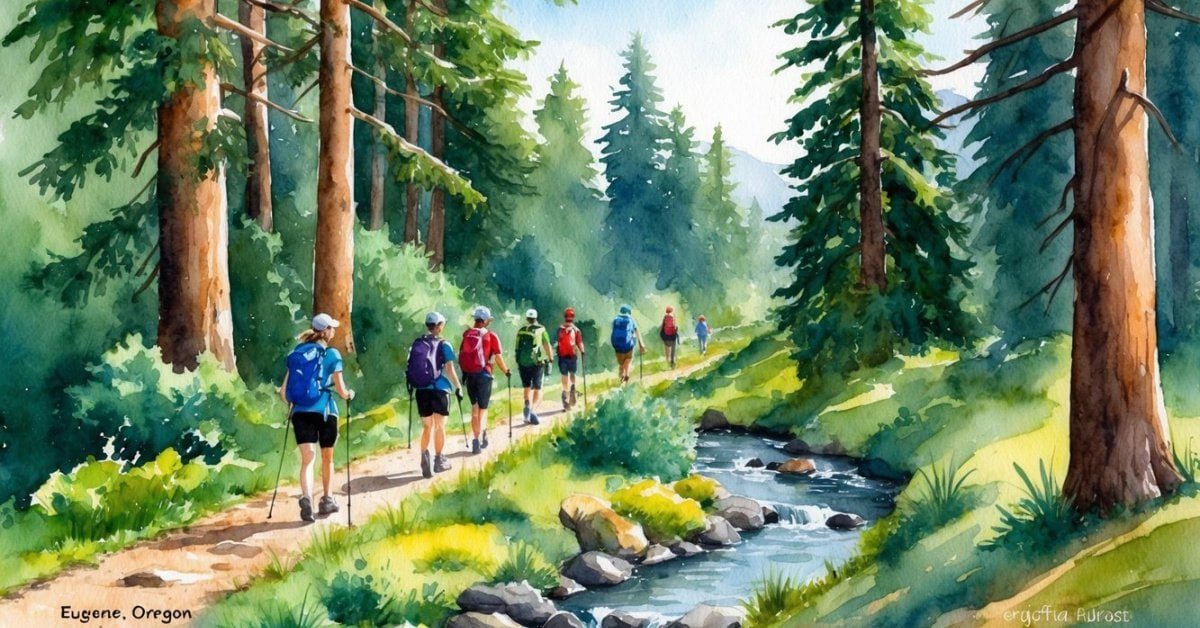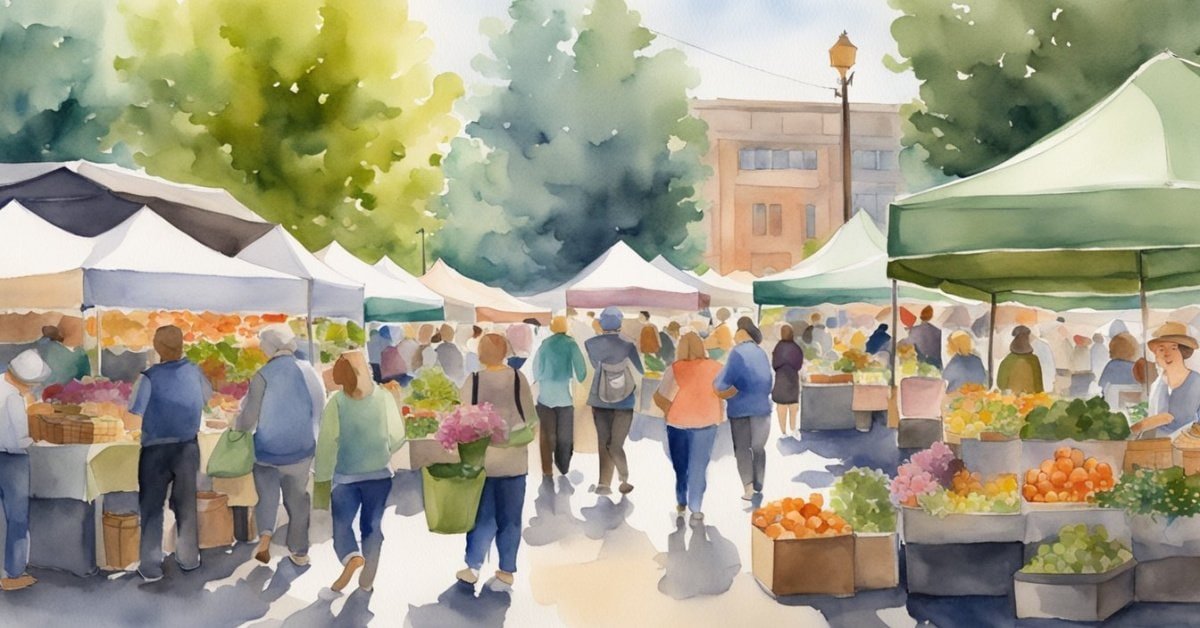Eugene, Oregon is known for being a liberal city rather than a conservative one. The city usually votes for Democratic candidates, and many local policies reflect more progressive values.
This political leaning shapes daily life, city government, and even community conversations.

People moving to Eugene or thinking about visiting often wonder how noticeable these political views are. Lane County, where Eugene is located, has voted Democratic in every presidential election since 2000, showing a clear pattern of liberal preference.
Some neighborhoods may have different leanings, but overall, Eugene stands out in Oregon as a place with a strong progressive identity. More details about voting patterns and political maps around Eugene can be found at bestplaces.net and through this political map of Eugene.
If someone is interested in what it’s really like living in a city with these values, exploring Eugene’s culture, community, and local issues can offer a unique look at how politics shape the area.
Is Eugene, Oregon Conservative or Liberal?

Eugene is known for its progressive attitudes and left-leaning politics. The city often stands out in Oregon for how strongly it supports Democratic candidates and liberal causes.
Political Landscape Overview
Eugene is considered one of the most liberal cities in the state of Oregon. The city’s voters often favor Democratic policies, and community discussions reflect strong support for social justice, environmental protection, and public education.
A map of the city’s political leanings highlights that many neighborhoods in and around Eugene consistently support Democratic candidates. The political map of Eugene shows dark blue areas, representing high concentrations of voters with liberal views.
The municipal government also tends to adopt progressive policies, often aligning with those seen in Portland and Corvallis. Republican support exists in rural areas near Eugene, but it is much less common within the city.
Historical Voting Trends
Since the year 2000, Lane County, where Eugene is located, has voted Democratic in every presidential election. This strong pattern points to a clear preference for liberal values among local voters throughout recent history.
Eugene’s role in Lane County’s results is significant, as the city contributes a large number of votes toward Democratic candidates in national and state elections. According to data from Best Places, Eugene remains “somewhat liberal,” a label supported by many election outcomes.
Local and state elections also show this trend. City council members and county commissioners from Eugene are mostly Democrats, and there is strong support for progressive statewide ballot measures.
Comparisons with Other Oregon Cities
Eugene is less conservative than many other cities in Oregon. It shares its left-leaning reputation with Portland and Corvallis, both known for being college towns with large populations of students and faculty who usually vote Democratic.
In contrast, cities like Salem–the state capital–tend to be more politically mixed. Salem often has a blend of Democrat and Republican voters.
Portland, Oregon’s largest city, is even more liberal, while Corvallis is also noted for electing progressive leaders. Eugene, though not quite as large as Portland, fits firmly into the group of Oregon’s most liberal urban areas.
Eugene’s City Government and Political Structure

Eugene, Oregon’s local government organizes much of city life, lawmaking, and policy decisions. The city council, government initiatives, and voting methods each shape its direction and leadership.
Role of the City Council
The Eugene City Council is the main legislative body for the city. It is made up of eight members who each represent different parts of Eugene.
The city council works with the mayor to pass laws, approve budgets, and set city policies. Council members are responsible for listening to community concerns and making decisions that impact everyday life.
They handle issues like public safety, parks, transportation, housing, and more. The city council holds public meetings where people can participate and share ideas.
Decisions are made by voting among council members. Eugene’s council is known for working on policies that reflect the views of its residents.
It often focuses on topics like sustainability, social justice, and growth. You can learn more about Eugene’s government and the city council’s roles on the official city website.
City Government Initiatives
Eugene’s city government is active in launching programs to improve life for its residents. These initiatives cover a range of areas, from protecting the environment to promoting affordable housing.
For example, the city has supported projects to build more bike paths and green spaces. It is also involved in partnerships to address climate change and reduce pollution.
Community safety, inclusion, and support for local arts are regular priorities. Many of these efforts are shaped by input from local commissions and advisory boards.
The city government also encourages public involvement, letting residents give feedback and help guide the direction of new programs. For more on city initiatives, see Eugene’s government website.
Influence of Ranked-Choice Voting
Ranked-choice voting lets voters rank candidates by preference instead of picking just one. Eugene has considered this method but has not implemented it for city elections yet.
This voting system is designed to give voters more choice and help elect candidates who better match community preferences. Ranked-choice voting can make campaigns more positive since candidates aim to be a preferred choice for a wider group.
It’s been debated in Eugene as a way to include more voices in the political process. City leaders continue to review if ranked-choice voting would be a good fit for Eugene’s needs.
The idea remains part of ongoing discussions as the city explores updates to its election process.
Key Political Issues and Community Involvement

Residents in Eugene, Oregon, address political concerns through organized activism, participation in their local neighborhoods, and by using technology to make their voices heard. These approaches help shape local decisions on human rights, safety, and community wellbeing.
Community Activism and Speak Out Events
Eugene has a strong tradition of community activism. People living in the city often organize or take part in speak out events to discuss social justice, the environment, and local government actions.
These events are open to anyone wanting to share opinions or push for change.
Common issues discussed include:
- Human rights and equity
- Environmental protection
- Drug policy
- Police practices
Local government often hosts these events to gather community feedback. This direct approach encourages residents to have a say and be part of the solution.
Groups in town use public parks or city spaces for meetings or rallies which adds to the city’s reputation for community activism.
Neighborhood Political Engagement
Neighborhoods in Eugene play a key role in local politics. The City’s Human Rights and Neighborhood Involvement office helps connect neighbors and address specific needs within each area.
Ways neighborhoods get involved:
- Voting on local development projects
- Setting up neighborhood watch groups
- Hosting regular meetings for residents
- Addressing local safety and equity questions
This focus on local engagement lets small community groups directly influence city decisions. It also builds connections between residents and helps ensure everyone feels heard.
Efforts like these are supported by city programs designed to create an equitable and welcoming community.
Use of Digital Apps for Civic Participation
Eugene residents use digital apps to take part in the city’s politics and services. Technology makes it easier to report issues, join city discussions, and stay informed about events and policy changes.
Popular uses for civic apps include:
- Reporting potholes or safety issues
- Participating in surveys or polls
- Checking the city calendar for public forums
- Submitting feedback on local projects
Online platforms also connect people from different neighborhoods who might not meet in person. These tools give more residents a chance to participate and share their views, helping local leaders make informed decisions based on broad community input.
Comparison with Surrounding Cities

Eugene’s political identity can be better understood by looking at its neighbors. Each nearby city has its own political leanings and helps shape the area’s overall character.
Springfield’s Political Identity
Springfield sits just east of Eugene. The two cities are often linked, but Springfield tends to be more conservative than Eugene.
While Eugene is known for its liberal values, Springfield’s voters often support more traditional and moderate candidates. Local elections in Springfield show more Republican and independent support than in Eugene.
Some neighborhoods lean Democratic, but conservative views are more common. Community events and public discussions in Springfield sometimes reflect these differences.
The economic base in Springfield also affects its politics. With a larger focus on manufacturing and blue-collar jobs, policies that support business and local industries are popular.
This contrasts with Eugene’s college-town atmosphere, which brings in progressive ideas from the university and students. These varied priorities appear in voting results and everyday conversations.
Take a look at a political map of Eugene compared to surrounding areas, and you’ll see Springfield stands out as less liberal.
Influence of Portland and Corvallis on Regional Politics
Portland, about two hours north, is the largest city in Oregon and is known for its very liberal politics. This reputation spreads, influencing other cities in western Oregon, including Eugene, with progressive ideas and activism.
Corvallis, located north of Eugene, is home to Oregon State University. Like Eugene, it has a college-town feel, drawing in young adults and academic professionals.
Because of this, Corvallis shares Eugene’s Democratic lean. Both Portland and Corvallis often vote for Democratic candidates in national and local elections.
Their influence can make progressive policies more common in western Oregon, even though small cities outside Eugene and Portland may vote differently. You can see the difference in voting patterns by checking out the political leanings of nearby towns.
This mix of influences gives each city a unique political flavor, even though they share some common trends.
State and Federal Representation

Eugene, Oregon is known for its progressive stance in politics and is most often represented by Democrats at both the state and federal level. These patterns can be seen in who holds office as well as in policy decisions that affect the area.
U.S. Senators and Their Impact
Oregon is represented in the U.S. Senate by two Democrats. They focus on issues like healthcare, education, and climate change.
These senators often support policies that line up with more liberal views, reflecting the general leaning of the state. Both senators have consistently won by a large margin in statewide elections.
Their focus includes supporting local schools, public land protections, and social safety nets. They often advocate for laws that benefit the environment, which is important to many people living in Eugene and the wider Oregon area.
Oregon’s senators play important roles on Senate committees. They help guide decisions that affect not just Eugene, but all of Oregon.
Their influence can be seen in federal funding for public transportation and green energy projects.
Statewide Political Dynamics
At the state level, Oregon also tends to lean Democratic. Legislative seats from Eugene and the surrounding Lane County area are typically held by members of the Democratic Party.
This matches the city’s reputation for being liberal rather than conservative. Lane County, where Eugene is located, has voted Democratic in all recent presidential elections.
The statewide government has prioritized environmental protection, education improvements, and healthcare reform. These priorities are visible in the laws passed by Oregon’s state legislature.
Representation for Eugene at the state level focuses heavily on social services, clean energy, and workers’ rights. The political climate in Eugene is influenced by statewide trends that support more liberal policy choices.
This creates laws and programs that align more with Democratic values, as shown in Oregon’s political map.
Crime and Public Safety Perspectives

Eugene, Oregon has a mix of concerns and ideas about crime and safety. Community members, city government, and candidates for office express different views and suggest new models for dealing with public safety.
Public Perception of Crime in Eugene
Many residents in Eugene are concerned about crime in their neighborhoods. Some feel that issues like theft, drug use, and homelessness affect their sense of safety.
The city government has taken steps to address these concerns. In 1863, Eugene hired its first city marshal, starting the Eugene Police Department.
Some people in Eugene support new approaches to public safety. One example is CAHOOTS, a local crisis intervention program that handles non-violent calls related to mental health, homelessness, and addiction.
This program has caught national attention as a model for “reimagining” how cities respond to certain types of emergencies. Learn more about these new models for public safety in Eugene on this public safety discussion.
Political Impacts on Safety Policy
Public safety is often a major topic in Eugene’s political discussions. City leaders and candidates for office offer different ideas for how to respond to crime and improve safety.
Some political candidates make crime and law enforcement a top priority, with calls for stronger police presence or legal changes. Others focus on prevention and alternative crisis response systems instead of traditional policing.
Recent candidates for local and state positions have highlighted public safety and received support from law enforcement groups. Details from campaigns like those for Monique DeSpain show these policy debates in action.
The city government listens to these views and tries to balance community expectations with effective public safety strategies. This sometimes leads to changes in how Eugene funds and organizes its police and crisis services.





